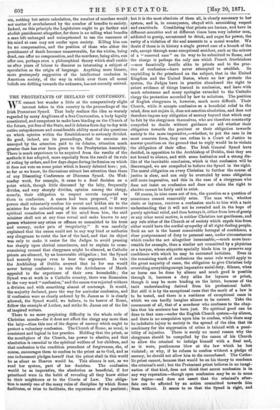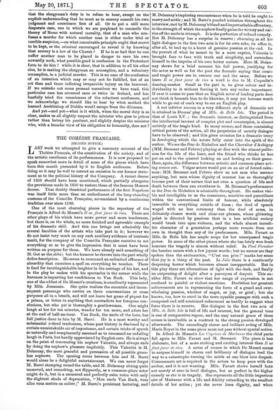THE PROTESTANTS OF IRELAND ON CONFESSION.
WE cannot but wonder a little at the comparatively slight interest taken in this country in the proceedings of the Irish Protestant Synod. That body realizes the idea so warmly regarded by many Anglicans of a free Convocation, a body legally constituted, and competent to make laws binding on the Church of the future, yet free of the State, and it debates from day to day with entire outspokenness and considerable ability most of the questions on which opinion within the Establishment is seriously divided. So good, indeed, are its proceedings, that its enemies are annoyed by the attention paid to its debates, attention much greater than has ever been given to the Presbyterian Assembly. There is much experience to be acquired from the results of the methods it has adopted, more especially from the result of its rule of voting by orders, and few days elapse during its Session on which it does not vote on some point which is keenly debated here ; yet, so far as we know, its discussions attract less attention than those of any Dissenting Conference or Diocesan Synod. On Wed- nesday week, for example, it came to a final decision on a point which, though little discussed by the laity, frequently divides, and very sharply divides, opinion among the clergy, namely, their obligation to respect secrets imparted to them in confession. A. canon had been proposed, " If any person shall voluntarily confess his secret and hidden sin to the minister for the unburthening of his conscience, and to receive spiritual consolation and ease of his mind from him, the said minister shall not at any time reveal and make known to any person whatever any crime or offence so committed to his trust and secrecy, under pain of irregularity." It was carefully explained that the canon could not in any way bind or authorize any clergyman to resist the law of the land, and that its object was only to make it easier for the Judges to avoid pressing too sharply upon clerical consciences, and to explain to cross- examining counsel that clergymen might be silenced, as Catholic priests are silenced, by an honourable obligation ; but the Synod had scarcely temper even to hear the argument. In vain the Archbishop of Dublin averred that he for one would never betray confession ; in vain the Archdeacon of Meath appealed to the experience of their own households ; the Synod was at work in a Catholic country, there was Romanism in the very word " confession," and the canon was rejected without a division and with something almost of contempt. It would, the majority declared, pave the way for auricular confession, and if confession were as clearly ordered by St. James as it is clearly allowed, the Synod would, we believe, in its horror of Rome, follow the example of Luther, and strike St. James out of the list of inspired writers.
There is no more perplexing difficulty in the whole code of Christian morals—for it does not affect the clergy any more than the laity—than this one of the degree of secrecy which ought to protect a voluntary confession. The Church of Rome, as usual, is consistent and logical in her practice. Holding that the priest, as the mouthpiece of the Church, has power to absolve, and that absolution is essential to the spiritual welfare of her children, and that confession is the condition precedent of forgiveness, she, of course, encourages them to confess to the priest as to God, and as one inducement pledges herself that the priest shall in this world be as silent as Heaven would be. This silence is not, as we
read her system, part of her doctrine. The confession would be as imperative, the absolution as beneficial, if her priesthood were in the habit of revealing all they knew either to their neighbours or to the Courts of Law. The obliga- tion is merely one of the many rules of discipline by which Rome facilitates, or tries to facilitate, the repentance of the penitent ;
but it is the most absolute of them all, is clearly necessary to her system, and is, in consequence, obeyed with astonishing respect and exactitude. Considering that priests are human, and have in different countries and at different times been very inferior men, addicted to gossip, accustomed to drink, and eager for power, the
rarity of a violation of the seal amounts to a moral wonder. We
doubt if there is in history a single proved case of a breach of the rule, except through some exceptional accident, such as the seizure of a " reserved case " on its way to be submitted to Rome, and the charge is perhaps the only one which French freethinkers —men fanatically hostile alike to priests and to the prac- tice of confession—have never attempted to establish. So unyielding is the priesthood on the subject, that in the United Kingdom and the United States, where no law protects the system, the Judges have in practice abandoned the right to extort evidence of things learned in confession, and have with much reluctance and many apologies extended to the Catholic clergy the protection accorded by law to solicitors. The position of English clergymen is, however, much more difficult. Their Church, while it accepts confession as a beneficial relief to the mind, does not enjoin it, does not sanction absolution, and does not therefore impose any obligation of secrecy beyond that which may be felt by the clergymen themselves, who are therefore constantly compelled to decide without guidance or aid whether their obligation towards the penitent or their obligation towards society is the more imperative,—whether, to put the case in its most concrete form, they can refuse in a Court of Justice to answer questions on the ground that to reply would be to violate the obligation of their office. The Irish General Synod have decided, in opposition to the Archbishop of Dublin, that they are not bound to silence, and with some hesitation and a strong dis- like of the inevitable conclusion, which is that confession will be discouraged, we are compelled to believe the Synod in the right. The moral obligation on every Christian to further the course of justice is clear, and can only be overruled by some obligation still more imperative, and this in the case of a clergyman who does not insist on confession and does not claim the right to absolve cannot be fairly said to exist.
Of course, in nine cases out of ten, the question as a question of conscience cannot reasonably arise. The man who, whether cleric or layman, receives a confession made to him with a tacit understanding that it will not be revealed and in the hope of purely spiritual relief, and then betrays it, either from love of gossip or any other usual motive, is neither Christian nor gentleman, and any rule either of the Church or of society which expels him from either would have the cordial sympathy of all right-feeling people. Such an act is the basest conceivable betrayal of confidence, a clear postponement of duty to personal ease, under circumstances which render the act altogether inexcusable,—much more inex- cusable for example, than a similar act committed by a physician or a lawyer, whose etiquette specially binds him to preserve any confidence with which he may be entrusted inviolate. Even in the remaining tenth of confessions the same rule would apply to the great majority of cases, the obligation to give Christian help overriding everything except imperative social duty. Silence, when no harm can be done by silence and much good is possible through it, becomes a duty alike for layman or priest, though it may be more binding on the latter, because of the tacit understanding derived from his professional habit. But still it is by the exceptional cases that the merit of a law is to be tested, and there is a residuum of exceptional cases in which we can hardly imagine silence to be correct. Take the commonest of all, that of a murderer who confesses to the chap- lain that his sentence has been just. No spiritual good can be done to that man—under the English Church system—by silence, and there is no compulsion upon him to confess, while there may be indefinite injury to society in the spread of the idea that its machinery for the suppression of crime is tainted with a possi- bility of injustice. There is surely no moral reason why the clergyman should be compelled by the canon of his Church to allow the criminal to indulge himself with a final and, as it were, posthumous blow at the law which he has violated ; or why, if he refuses to confess without a pledge of secrecy, he should not allow him to die unconfessed. The Catho- lic priest cannot, because that would be on his theory to condemn the criminal's soul ; but the Protestant priest believes in no imagi- nation of that kind, does not think that secret confession is in any way reparation—though open confession may be so in some low degree—and does not assert that the criminal's after- fate can be affected by an action committed towards him from without. It seems to us that the Synod is right, and
that the clergyman's duty is to refuse to hear, except on the explicit understanding that he must as to secrecy consult his own judgment and conscience first of all. Or to put a still more desperate case, one in which we are perplexed to reconcile the theory of Rome with natural morality, that of a man who con- fesses a murder for which another man is either under trial or terrible suspicion,—on what conceivable principle ought that secret to be kept, or the criminal encouraged to reveal it by knowing that secrecy is a law of the Church ? If he is so bad that he can suffer another man to be placed in danger to save his own cowardly neck, what possible good is confession in the Protestant form to do him ? while it is clear, that in addition to all his other sins, he is making the clergyman an accomplice, and a voluntary accomplice, in a judicial murder. This is no case of the confession of an intention which may or may not be fulfilled, but of an act then and there inflicting irreparable injury on the innocent. If we mistake not some peasant narratives we have read, this particular case has occurred once or twice in Ireland, and has fearfully tried the consciences of the reluctant confessors, and we acknowledge we should like to hear by what method the learned Archbishop of Dublin would escape from the dilemma.
And yet—and yet—what is it which, when the moral duty is so clear, makes us all slightly respect the minister who goes to prison rather than betray his penitent, and slightly despise the minister who, with a broader view of his obligation to humanity, does not ?



































 Previous page
Previous page